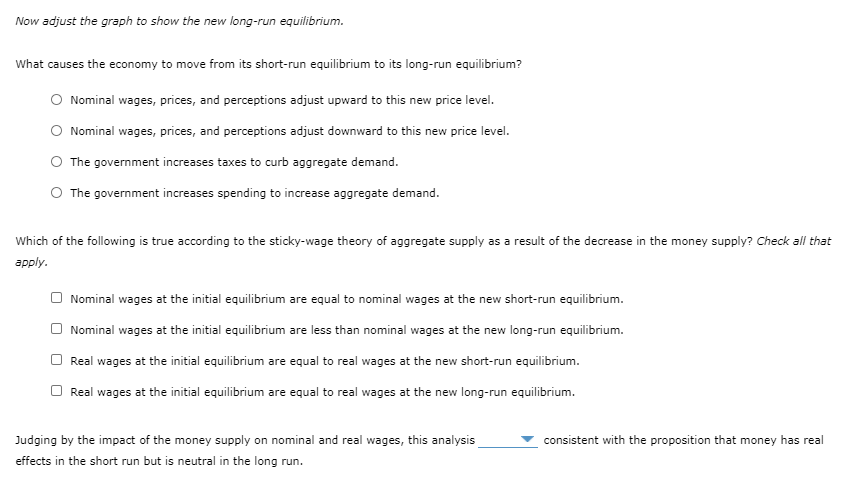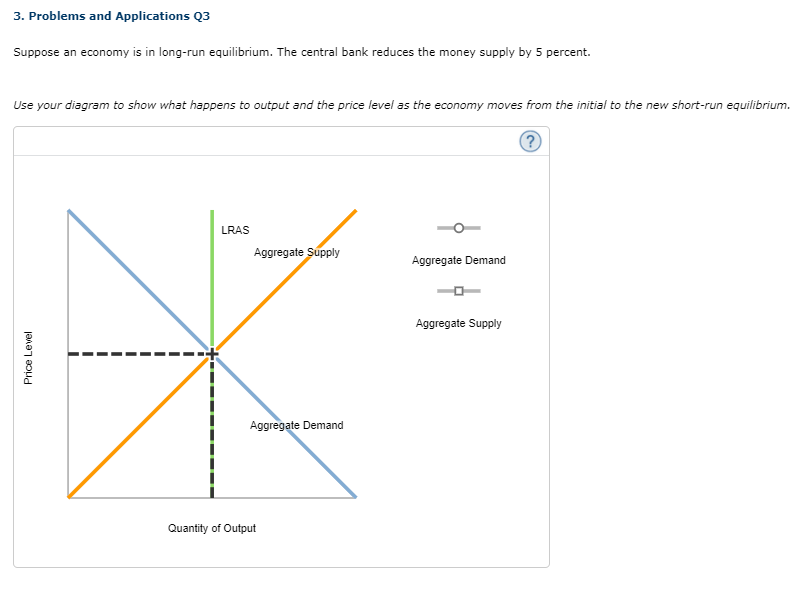Suppose an economy is in long-run equilibrium. The central bank reduces the money supply by 5 percent. Use your diagram to show what happens to output and the price level as the economy moves from the initial to the new short-run equilibrium. LRAS Aggregate Supply Aggregate Demand Aggregate Supply Aggregate Demand Quantity of Output Price Level
Suppose an economy is in long-run equilibrium. The central bank reduces the money supply by 5 percent. Use your diagram to show what happens to output and the price level as the economy moves from the initial to the new short-run equilibrium. LRAS Aggregate Supply Aggregate Demand Aggregate Supply Aggregate Demand Quantity of Output Price Level
Principles of Economics (MindTap Course List)
8th Edition
ISBN:9781305585126
Author:N. Gregory Mankiw
Publisher:N. Gregory Mankiw
Chapter33: Aggregate Demand And Aggregate Supply
Section: Chapter Questions
Problem 3PA
Related questions
Question
100%
Note:- Please consider this as one whole question these are not separate questions. For this question need all the possible correct answer as soon as possible.

Transcribed Image Text:Now adjust the graph to show the new long-run equilibrium.
What causes the economy to move from its short-run equilibrium to its long-run equilibrium?
Nominal wages, prices, and perceptions adjust upward to this new price level.
Nominal wages, prices, and perceptions adjust downward to this new price level.
The government increases taxes to curb aggregate demand.
The government increases spending to increase aggregate demand.
Which of the following is true according to the sticky-wage theory of aggregate supply as a result of the decrease in the money supply? Check all that
аpply.
Nominal wages at the initial equilibrium are equal to nominal wages at the new short-run equilibrium.
Nominal wages at the initial equilibrium are less than nominal wages at the new long-run equilibrium.
Real wages at the initial equilibrium are equal to real wages at the new short-run equilibrium.
Real wages at the initial equilibrium are equal to real wages at the new long-run equilibrium.
Judging by the impact of the money supply on nominal and real wages, this analysis
consistent with the proposition that money has real
effects in the short run but is neutral in the long run.

Transcribed Image Text:3. Problems and Applications Q3
Suppose an economy is in long-run equilibrium. The central bank reduces the money supply by 5 percent.
Use your diagram to show what happens to output and the price level as the economy moves from the initial to the new short-run equilibrium.
LRAS
Aggregate Supply
Aggregate Demand
Aggregate Supply
Aggregate Demand
Quantity of Output
Price Level
Expert Solution
This question has been solved!
Explore an expertly crafted, step-by-step solution for a thorough understanding of key concepts.
This is a popular solution!
Trending now
This is a popular solution!
Step by step
Solved in 4 steps with 2 images

Knowledge Booster
Learn more about
Need a deep-dive on the concept behind this application? Look no further. Learn more about this topic, economics and related others by exploring similar questions and additional content below.Recommended textbooks for you

Principles of Economics (MindTap Course List)
Economics
ISBN:
9781305585126
Author:
N. Gregory Mankiw
Publisher:
Cengage Learning

Principles of Economics, 7th Edition (MindTap Cou…
Economics
ISBN:
9781285165875
Author:
N. Gregory Mankiw
Publisher:
Cengage Learning

Essentials of Economics (MindTap Course List)
Economics
ISBN:
9781337091992
Author:
N. Gregory Mankiw
Publisher:
Cengage Learning

Principles of Economics (MindTap Course List)
Economics
ISBN:
9781305585126
Author:
N. Gregory Mankiw
Publisher:
Cengage Learning

Principles of Economics, 7th Edition (MindTap Cou…
Economics
ISBN:
9781285165875
Author:
N. Gregory Mankiw
Publisher:
Cengage Learning

Essentials of Economics (MindTap Course List)
Economics
ISBN:
9781337091992
Author:
N. Gregory Mankiw
Publisher:
Cengage Learning

Brief Principles of Macroeconomics (MindTap Cours…
Economics
ISBN:
9781337091985
Author:
N. Gregory Mankiw
Publisher:
Cengage Learning

Principles of Macroeconomics (MindTap Course List)
Economics
ISBN:
9781305971509
Author:
N. Gregory Mankiw
Publisher:
Cengage Learning

Principles of Macroeconomics (MindTap Course List)
Economics
ISBN:
9781285165912
Author:
N. Gregory Mankiw
Publisher:
Cengage Learning